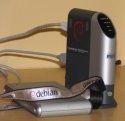Debian Etch loves the Slug
Nov 14, 2006 — by LinuxDevices Staff — from the LinuxDevices Archive — 10 views The “Slug” has gained much-improved Linux support, thanks to a new Debian installer that targets the device. The first release candidate of the debian-installer for Debian's forthcoming “Etch” distribution was released yesterday, offering nearly complete support to the Linksys $99 NSLU2 NAS gadget.
The “Slug” has gained much-improved Linux support, thanks to a new Debian installer that targets the device. The first release candidate of the debian-installer for Debian's forthcoming “Etch” distribution was released yesterday, offering nearly complete support to the Linksys $99 NSLU2 NAS gadget.
(Click for larger view of the Slug)
digg this story |
The NSLU2, aka “Slug,” is a sub-$100 device based on an Intel IXP4xx processor, a chip first ported to Linux by SnapGear. Linksys markets the device as an inexpensive way to turn USB hard drives into network shares. However, the Linux community has produced a variety of commercial and free alternative firmware images for the device, for applications ranging from network media servers to car computers, to solar-powered remote sensing devices. The NSLU2-Linux community site hosts a variety of alternative firmware downloads.
Among the most interesting hacks of the Slug is Peter Korsgaard's original work to get the device to run full Debian ARM Linux. Obviously, once the device works as a generic Debian box, the potential for customization becomes limitless, through the power of apt-get and the large repository of Debian ARM packages.
Now, the newly available RC1 release of debian-installer for Etch makes installing Linux on the Slug much easier, according to Debian ARM hacker Martin Michlmayr. For one thing, the generic IXP4xx kernel in Debian ARM now appears to support the device.
Michlmayr writes:
The first release candidate of debian-installer for the upcoming release of Debian has just been released and features enhanced support for the popular Linksys NSLU2 consumer device. Initial support for NSLU2 was added in beta 2 of the installer in March, but the new release adds major new functionality.
New features in this version include functionality to automatically write the new kernel to flash upon upgrade, together with a ramdisk that can boot from [a] USB hard drive. APEX is now used as a second stage boot loader called by RedBoot to work around the system's limitation of 1 MB for the Linux kernel. This version of the installer still uses Intel's out-of-tree Ethernet driver with their proprietary microcode. Unofficial images containing this microcode are available, as are detailed installation instructions.
Future plans for the near future are the integration of an open-source Ethernet driver for the IXP4xx platform written by Christian Hohnstaedt and tested on NSLU2 by the NSLU2-Linux project. With the exception of the proprietary microcode which will be provided separately, the upcoming release of Debian, version 4.0 (codename etch), will therefore fully support this popular and low-cost ARM platform.
Additional details about the current state of Debian on the NSLU2 can be found in Michlmayr's Debian-on-NSLU2 Howto.
Michlmayr also maintains a page about Debian on IOP-based storage devices, such as the Thecus N2100 and GLAN Tank.
This article was originally published on LinuxDevices.com and has been donated to the open source community by QuinStreet Inc. Please visit LinuxToday.com for up-to-date news and articles about Linux and open source.